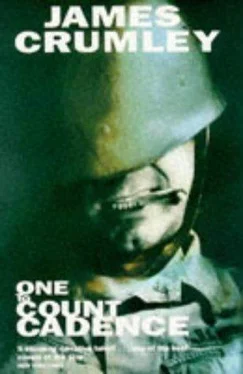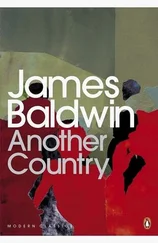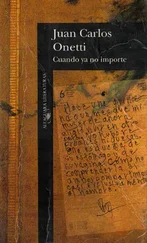James Crumley - One to Count Cadence
Здесь есть возможность читать онлайн «James Crumley - One to Count Cadence» весь текст электронной книги совершенно бесплатно (целиком полную версию без сокращений). В некоторых случаях можно слушать аудио, скачать через торрент в формате fb2 и присутствует краткое содержание. Жанр: Триллер, на английском языке. Описание произведения, (предисловие) а так же отзывы посетителей доступны на портале библиотеки ЛибКат.
- Название:One to Count Cadence
- Автор:
- Жанр:
- Год:неизвестен
- ISBN:нет данных
- Рейтинг книги:3 / 5. Голосов: 1
-
Избранное:Добавить в избранное
- Отзывы:
-
Ваша оценка:
- 60
- 1
- 2
- 3
- 4
- 5
One to Count Cadence: краткое содержание, описание и аннотация
Предлагаем к чтению аннотацию, описание, краткое содержание или предисловие (зависит от того, что написал сам автор книги «One to Count Cadence»). Если вы не нашли необходимую информацию о книге — напишите в комментариях, мы постараемся отыскать её.
One to Count Cadence — читать онлайн бесплатно полную книгу (весь текст) целиком
Ниже представлен текст книги, разбитый по страницам. Система сохранения места последней прочитанной страницы, позволяет с удобством читать онлайн бесплатно книгу «One to Count Cadence», без необходимости каждый раз заново искать на чём Вы остановились. Поставьте закладку, и сможете в любой момент перейти на страницу, на которой закончили чтение.
Интервал:
Закладка:
As he poured, I asked. "Why?"
"It's seldom men know why they do things," he said, then reflected a bit. How like him to know what I was asking. "Maybe because I hated to see anyone, even you, railroaded into Leavenworth."
"Not much of a reason."
"No, I guess not." He sat his drink down, then dug into his hair and continued with a nervous chuckle, "And not even the real one either."
I waited. I had time.
"You might say I did it because I used to dream about you when I was a child. Or have nightmares, I guess, would be more accurate." His face drifted through a series of frowns and half-smiles as he leaned back in the chair and clasped his hands behind his neck.
"I suppose I'm obligated to be flattered or something, but I don't really know what the hell you mean."
"Oh, not you really. It's a funny thing, a long story. You see, I've got this thing… ha! got… had this thing for World War I airplanes when I was a kid. I must have built thirty or forty models of them – it took ten tries to get one to fly; but it did finally fly. Perfectly. Nearly a quarter of a mile down the road to a neighbor's place and made this perfect landing. I ran all the way with it. God, I ran. But it landed, as I said, perfectly, but in a hog pen, of course, and the damned hogs trampled it and chewed it and ate it, rubber bands and all." He smiled to himself; he had forgotten about me. "God knows why. Maybe they liked the way the glue smelled or maybe they just didn't care for their pen to be used as a landing strip. Who the hell knows? They ate it though, every bit of it, and all the while I was crying and throwing clods at them, but they just bounced off their fat, complacent rumps. I ran home and cried to my mother that it wasn't fair, but she said that God didn't promise that life would be fair, but that He would have mercy. Well, I said so much for a guy who doesn't play fair, and that was the end of that.
"Where was I? Oh, yes. Anyway, in spite of God in heaven and pigs in the world, I kept building airplanes, tried some design modifications on the plans I got out of Popular Mechanics, even designed a few of my own," he said with pride. "And when I hurt my hand, the worst pain came from not being able to work on the airplanes. And then I became so wrapped up, so obsessed, that I began to dream about them. Every night. Every time I closed my eyes I was in the cold, blue air over France in a Camel. God, I was a gay, rake-hell dog, too. Theatrical smudges of grease here and there, a scuffed leather jacket. But no scarf. I had better taste even then." He laughed, then drank, perhaps dreaming of the thundering wind, the rainbow circling his biplane's shadow as it leaped and ran and leaped again over the hedges.
"I, of course, was an ace at thirteen; but there was always a single dark cloud in my dreaming sky. Perhaps I'd learned something from the hogs. The cloud didn't show up often, but often enough, and always so damned unexpectedly. I called him the Black Baron of Beirut, for reasons I've long since forgotten, but I think his name was Baron von Rumplested or something silly like that. He was always dropping out of the sun just after I had vanquished six Fokkers and wham! down I'd go in one of those awful falling dreams and then wake up in cold, heaving sweats. Not a dogfight, no contest, just wham! and down I'd go. He never bothered with finesse or fancy maneuvers or anything, he just swooped down and shot hell out of me. Once when my guns had jammed, he had the gall to pour sheep-dip all over me, and while I was trying to get it out of my eyes, he dropped the five gallon can on my right wing and broke it off.
"God, how I hated him. How glad I was when I exchanged the airplanes for women and the dreams ended. But I never forgot that face, that beaklike nose and that evil moustache drooping past the corners of his mouth. He was a dark German, an Asiatic German, not at all a warm, sunburnt Nordic German. His face looked like the word 'Hun' sounds, and his eyes always made me think of the Black Forest, even after I learned that it was in West Germany. And later when I was older and had a real war to deal with, when I found out it wasn't anything except stupid and evil and cruel and without honor, his face became all that dark, primitive nature, that dark, throbbing blood, that fogged crossroads where evil meets beauty, and…" He stopped; perhaps at the crossroads he paused once again, then went on because he thought he knew the way.
"Guess I got carried away. But I haven't talked about the dreams since the War, or even thought about them, and was glad to forget… until I saw your crazy, roaring eyes and mad face straining up at me as if I were the enemy, and I thought you were someone I knew. Then I realized you were the Baron's son – no, the Baron himself, and so I… What the hell are you grinning about?" he asked, seeming half-angry. "What's so damned funny?"
I told him.
Once upon a time (yes, once upon a time, for this too is a fairy tale as all history is, and it, even more like history, makes its truth not from fact but from belief and, yes, I do believe) near where the present borders of East and West Germany and Czechoslovakia share a common point, where the old boundaries of Bavaria, Bohemia, and Saxony once merged in that indefinite way politics and religion and war joined in those days, there used to be a small village, called Krummel. The village served a small, nameless (as far as the journals of the first of us are concerned) monastery which brewed a tiny amount of a special heavy beer, described as being as good and as thick as black bread. The village, lying in a small valley served by a single road of sorts which ended at the village, or beyond, as you will, existed solely for the purpose of growing grain, hops and such for the brewery. The monastery and thus the village belonged, ostensibly, to an old abbot in Hof, but it had been many years since the abbot had made the rough, long trip through a range of rugged hills to Krummel, and by the period which most concerns me, the monastery regulations were quite lax. In fact the only difference between a monk and a villager was where the man worked, brewery or fields. As you might expect, Krummel suffered a peaceful isolation, nearly untroubled by visitors from the world.
Sometime during the early years of the seventeenth century, though, a visitor did appear; one Jacob Slagsted, driving a combined medicine-peddler's wagon, selling magic, feats of strength, stinking (thus potent) herbs, tinkering skills, and various domestic goods. This Slagsted seems to have been a giant of a man, but agile enough for his own wizardry. And even more impressive, he could read. He claimed to be a retired, reformed mercenary, and there may even be some truth in the village gossip which said, "Reformed into a highwayman." There were even those who claimed that Slagsted was hiding from both the authorities and his own merry band of cutpurses.
He took a several weeks' advantage of the hospitality of the monks, spending more for the beer than he took in for his goods and services, and in fact created a small economic boom in Krummel during his visit. There were many sad faces among monk, villager, and wife when Jacob finally left. He wasn't your run-of-the-mill peddler, though, and wasn't quickly forgotten, what with his breaking logs on his head and slipping pigeons and larks and finches out of the air and great, passionate readings from his Good Book in Latin, a large, leather copy which he kept in a carved camphor chest fit for at least a duke or a heathen Turk. No, he was not quickly forgotten. Nor, I suppose, did he forget the isolated village, the quiet valley, the fine beer, for he returned five years later.
The villagers found his wagon one winter morning; his horse hipshot, lather frozen on its flanks, still standing unharnessed. Slagsted was huddled in the wagon box, a great, red shield of blood frozen on his chest. The monks, as monks in spite of their religion will, were kind to him, carried him into the monastery, revived him with crude brandy and shook their heads at Jacob's tale of assault by highwaymen and attempted robbery and a gallant fight against overwhelming odds. Some may have doubted his story, but none doubted that he would die before morning, and the shelter and care they offered was to a dying man. But the old devil wouldn't give up the ghost, and once he had his hands firmly around it, he wouldn't leave the village. Through the long winter he stayed, helpful at small tasks, beer casks, and tales as he repaired crockery and tin for the village hausfrauen. Oh, the heathen wars he had lived over, the fighting, the looting… But as spring came, Slagsted went more often for singular walks, roaming the stubbled, muddy fields or the small, irregular hills near the edge of the valley, and once even disappeared into the forest for several days. He returned, but when asked where he had been, he merely gave a deep, serene smile in answer. Somehow, however these things happen, the rumor started that Jacob Slagsted, man of uncertain origin, man of Low German, High German, Bohemian and other unknown tongues, had been seen conversing with the Virgin during his wanderings.
Читать дальшеИнтервал:
Закладка:
Похожие книги на «One to Count Cadence»
Представляем Вашему вниманию похожие книги на «One to Count Cadence» списком для выбора. Мы отобрали схожую по названию и смыслу литературу в надежде предоставить читателям больше вариантов отыскать новые, интересные, ещё непрочитанные произведения.
Обсуждение, отзывы о книге «One to Count Cadence» и просто собственные мнения читателей. Оставьте ваши комментарии, напишите, что Вы думаете о произведении, его смысле или главных героях. Укажите что конкретно понравилось, а что нет, и почему Вы так считаете.












